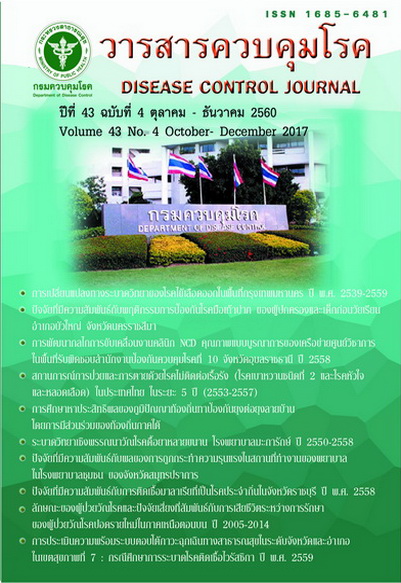Study on efficacy of local wisdom of traditional mosquito repellent to Aedes aegypti mosquito under community participation in the South of Thailand
DOI:
https://doi.org/10.14456/dcj.2017.5Keywords:
repellent activity, community knowledge, mosquito repellentAbstract
Dengue fevers have been an important disease in Thailand for a long time ranking one of the major health problems in the country. Although there are various control strategies for dengue disease, the partici¬pation from the local community play an important role in the success for disease control. At present, a lot of local people have seen the value of local wisdom and used this to improve their life. The local communi¬ty in the southern part of Thailand has used mosquito-repellent made from local wisdom for a long time. The problem regarding mosquito-repellent made from local wisdom is that the repellent have not yet been tested to clearly determine their effectiveness. Therefore the objective of this research is to determine the effective¬ness of mosquito-repellent that is made from local wisdom from 14 provinces in Thailand. From the survey, out of 14 provinces a total of 11 mosquito-repellents were found from 7 provinces which include the following: Krabi, Phatthalung, Phangnga, Yala, Pattani, Trang, and Narathiwat. The testing for efficacy of mosquito-repellent followed the protocol from WHO/HTM/NTD/WHOPES/2009.4. The test is done by using 4 treated volunteers with mosquito-repellent made from local wisdom covering 30 cm2 on their left hand and on their right hand treated with 12% DEET, the rest of the hand is protected with gloves. The volunteers insert their arms into 30 cm3 the cage containing 200 non-blood feed female Aedes aegypti mosquitos for 24 hours, aged 5-7 days. The biting behavior was observed every half an hour each time after exposing to mosquito for 3 minutes, the experiment stop when 2 mosquito are observed probing, the experiment time last for maximum of 8 hours. The protective time average of the mosquito-repellent was calculated using the time elapsed between the starting of mosquito repellent applied until the mosquito observed probing. The result shows that 2 mosquito-repellents made from local wisdom have the protection that last for more than 2 hours which are biore orange repellent cream (Krabi) and Citronella Tamaindus repellent milk cream (Phatthalung). The result of this research was reported back to the local community to re-eval¬uate their self-reliance on their protection toward mosquito biting.
Downloads
References
2. สำนักพัฒนาเกษตรกร กรมส่งเสริมการเกษตร. ลักษณะของภูมิปัญญาท้องถิ่น [อินเทอร์เน็ต]. [สืบค้นเมื่อ 12 ต.ค. 2556]. แหล่งข้อมูล: http:// www.agriinfo.doae.go.th/year52/knowledge/ km_10-03-52
3. สถาบันวิจัยวลัยรุกขเวช มหาวิทยาลัยมหาสารคาม. การศึกษาภูมิปัญญาพื้นบ้านอีสานในการใช้สมุนไพร กับสัตว์. กรุงเทพมหานคร: สำนักงานกองทุน สนับสนุนการวิจัย; 2545.
4. กัลยารัตน์ จำปา. การจัดการความรู้ภูมิปัญญาท้องถิ่นด้านสมุนไพรของชมรมสมุนไพรในเขต คำชะอี จังหวัดมุกดาหาร [รายงานการศึกษาอิสระ ปริญญารัฐประศาสนศาสตรมหาบัณฑิต]. ขอนแก่น: มหาวิทยาลัยขอนแก่น; 2553. 87 หน้า.
5. Hongsawong M. North Eastern Thai herbs: local wisdom application for conservation made by Khong River Community. European Journal of Social Sciences 2011;23:474-82.
6. อุษาวดี ถาวระ, อภิวัฏ ธวัชสิน, จารีย์ บันสิทธิ์, เย็นจิตร เตชะดำรงสิน. สมุนไพรป้องกันกำจัดแมลง ทางการแพทย์. กรุงเทพมหานคร: ดีไซร์; 2550.
7. คณะกรรมการอำนวยการจัดงานเฉลิมพระเกียรติ พระบาทสมเด็จพระเจ้าอยู่หัว. วัฒนธรรมพัฒนาการทางประวัติศาสตร์ เอกลักษณ์และภูมิปัญญาจังหวัดสระแก้ว. กรุงเทพมหานคร: คณะกรรมการ ฝ่ายประมวลเอกสารและจดหมายเหตุในคณะ กรรมการอำนวยการจัดงานเฉลิมพระเกียรติ พระบาทสมเด็จพระเจ้าอยู่หัวฯ; 2542.
8. สมโภชน์ สมบัติ. ผลิตเสื่อสมุนไพรตะไคร้หอม ไล่ยุง ถักทอจากภูมิปัญญาบ้านดอนหัน. คมชัดลึก.
2552 พ.ค. 20; 8 (CPS9576)
9.คณะทำงานปฏิบัติงานขับเคลื่อนการจัดการความรู้ในงานส่งเสริมการเกษตร.คู่มือฉบับชาวบ้านเรื่อง ควันไฟไล่แมลง. พัทลุง: สำนักงานเกษตรจังหวัด พัทลุง; 2555.
10. สถาบันพัฒนาอุตสาหกรรมสิ่งทอ. จีวรกันยุงสมุนไพร ไทยปลอดสารเคมี [อินเทอร์เน็ต]. [สืบค้นเมื่อ 10 ต.ค. 2556]. แหล่งข้อมูล: http://library.dip. go.th/Industrial%20Innovation/www/pro_ det1-068.html
11. Sree-iam S. The development of mosquito-re¬pellent formulations containing Citronella oil and Plai oil (Zingiber casumunar Roxb) [disserta¬tion]. Bangkok: Mahidol University; 1991. 165 p.
12. พรศักดิ์ ศรีอมรศักดิ์. การพัฒนาเจลไล่ยุงที่มีส่วน ผสมของน้ำมันหอมระเหยจากสมุนไพร. กรุงเทพ มหานคร: สำนักงานกองทุนสนับสนุนการวิจัย; 2550.
13. Sritabutra D, Soonwera M. Repellent activity of herbal essential oils against Aedes aegypti (Linn.) and Culex quinquefasciatus (Say.). Asian Pac J Trop Dis 2013;3:271-6.
14. Phasomkusolsil S, Soonwera M. Comparative mosquito repellency of essential oils against Aedes aegypti (Linn.), Anopheles dirus (Peyton and Harrison) and Culex quinquefasciatus (Say). Asian Pac J Trop Biomed 2011;1:S113-8.
15. Pates HV, Lines JD, Keto AJ, Miller JE. Per¬sonal protection against mosquitoes in Dar es Salaam, Tanzania, by using a kerosene oil lamp to vaporize transfluthrin. Med Vet Entomol 2002;16:277-84.
16. World Health Organization. Guidelines for effi¬cacy testing of mosquito repellents for human. Geneva: World Health Organization; 2009.
17. Kaewmanee S. Repellent effects of some selected medicinal plant extracts on mosquitoes [dissertation]. Bangkok: Mahidol University; 1992. 65 p.
18. Kim SI, Chang KS, Yang YC, Kim BS, Ahn YJ. Repellency of aerosol and cream productscon¬taining fennel oil to mosquitoes underlaboratory and field conditions. Pest Manag Sci 2004;60: 1125-30.
19. Karunamoorthi K. Tinjute [Labiatae; (Otostegia integrifolia]: a versatile Ethiopian ethnomedicinal plant-a systematic review of the scientific evidences. TANG 2014;4:1-6.
20. Karunamoorthi K, Hailu T. Insect repellent plants traditional usage practices in the Ethiopian malaria epidemic-prone setting: an ethnobotanical survey. J Ethnobiol Ethnomed 2014;10:1-11.
21. Kidane D, Tomass Z, Dejene T. Community knowledge of traditional mosquito repellent plants in Kolla Temben District, Tigray, North¬ern Ethiopia. Scie Res Essays 2013;8:1139- 44.
22. หทัยรัตน์ ริมคีรี, วิชัย หฤทัยธนาสันดิ์, พงษ์ศิริ วินิจฉัย. โลชั่นทากันยุ งจากน้ำมันหอมระเหยธรรมชาติ .การประชุมทางวิชาการของมหาวิทยาลัยเกษตรศาสตร์ สาขาอุตสาหกรรมเกษตร ครั้งที่ 37; วันที่ 3-5 กุมภาพันธ์ 2542; มหาวิทยาลัยเกษตรศาสตร์, กรุงเทพมหานคร. กรุงเทพมหานคร: 2542. 124-9.
Downloads
Published
How to Cite
Issue
Section
License
Articles published in the Disease Control Journal are considered as academic work, research or analysis of the personal opinion of the authors, not the opinion of the Thailand Department of Disease Control or editorial team. The authors must be responsible for their articles.






